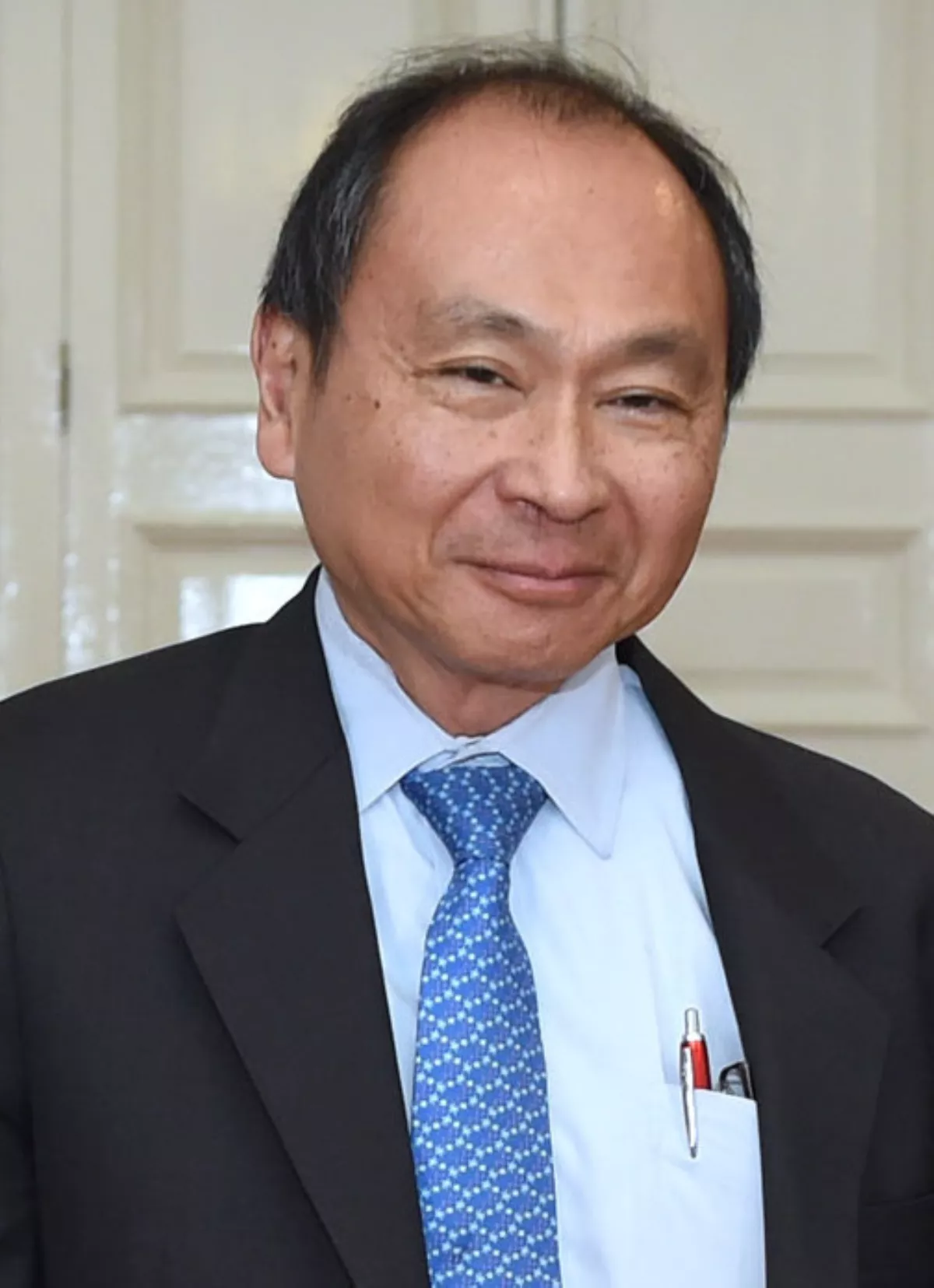 1.
1. Francis Yoshihiro Fukuyama is an American political scientist, political economist, and international relations scholar, best known for his book The End of History and the Last Man.

 1.
1. Francis Yoshihiro Fukuyama is an American political scientist, political economist, and international relations scholar, best known for his book The End of History and the Last Man.
Francis Fukuyama has been a senior fellow at the Freeman Spogli Institute for International Studies since July 2010 and the Mosbacher Director of the Center on Democracy, Development and the Rule of Law at Stanford University.
Francis Fukuyama had been the Omer L and Nancy Hirst Professor of Public Policy at the School of Public Policy at George Mason University.
Francis Fukuyama is a council member of the International Forum for Democratic Studies founded by the National Endowment for Democracy and was a member of the Political Science Department of the RAND Corporation.
Francis Fukuyama is one of the 25 leading figures on the Information and Democracy Commission launched by Reporters Without Borders.
Francis Fukuyama was born in the Hyde Park neighborhood of Chicago, Illinois, United States.
Francis Fukuyama's mother, Toshiko Kawata Fukuyama, was born in Kyoto, Japan, and was the daughter of Shiro Kawata, founder of the Economics Department of Kyoto University and first president of Osaka City University.
Francis Fukuyama's family moved to State College, Pennsylvania, in 1967.
Francis Fukuyama received his Bachelor of Arts degree in classics from Cornell University, where he studied political philosophy under Allan Bloom.
Francis Fukuyama initially pursued graduate studies in comparative literature at Yale University, going to Paris for six months to study under Roland Barthes and Jacques Derrida but became disillusioned and switched to political science at Harvard University.
Francis Fukuyama lived at the Telluride House and has been affiliated with the Telluride Association since his undergraduate years at Cornell.
Francis Fukuyama is best known as the author of The End of History and the Last Man, in which he argued that the progression of human history as a struggle between ideologies was largely at an end, with the world settling on liberal democracy after the end of the Cold War and the fall of the Berlin Wall in 1989.
Francis Fukuyama has written a number of other books, among them Trust: The Social Virtues and the Creation of Prosperity and Our Posthuman Future: Consequences of the Biotechnology Revolution.
Francis Fukuyama is a fierce enemy of transhumanism, an intellectual movement asserting that posthumanity is a desirable goal.
Francis Fukuyama considers these disruptions to arise from a shift from the manufacturing to the Information Age.
In 2006, in America at the Crossroads, Francis Fukuyama discusses the history of neoconservatism, with particular focus on its major tenets and political implications.
In 2008, Francis Fukuyama published the book Falling Behind: Explaining the Development Gap Between Latin America and the United States, which resulted from research and a conference funded by Grupo Mayan to gain an understanding of why Latin America, once far wealthier than North America, fell behind in terms of development in only a matter of centuries.
Francis Fukuyama stated that an unequal distribution of wealth leads to social upheaval, resulting in stunted growth.
In 2018, in Identity: The Demand for Dignity and the Politics of Resentment, Francis Fukuyama enlists Plato's notion of thymos to understand the politics of grievance and resentment.
In 2022, Francis Fukuyama published the book Liberalism and Its Discontents, in which he defended liberalism from critics on the populist right and the progressive left.
Francis Fukuyama was active in the Project for the New American Century think tank starting in 1997, and as a member co-signed the organization's 1998 letter recommending that President Bill Clinton support Iraqi insurgencies in the overthrow of then-President of Iraq Saddam Hussein.
Francis Fukuyama was among forty co-signers of William Kristol's September 20,2001 letter to President George W Bush after the September 11,2001 attacks that suggested the US not only "capture or kill Osama bin Laden", but embark upon "a determined effort to remove Saddam Hussein from power in Iraq".
Francis Fukuyama began to distance himself from the neoconservative agenda of the Bush administration, citing its excessive militarism and embrace of unilateral armed intervention, particularly in the Middle East.
Francis Fukuyama believes that the Iraq War was being blundered.
Francis Fukuyama declared he would not be voting for Bush, and that the Bush administration had made three mistakes:.
Francis Fukuyama believes the US has a right to promote its own values in the world, but more along the lines of what he calls "realistic Wilsonianism", with military intervention only as a last resort and only in addition to other measures.
Francis Fukuyama announced the end of the neoconservative moment and argued for the demilitarization of the War on Terrorism:.
Francis Fukuyama endorsed Barack Obama in the 2008 US presidential election.
In 2020, Francis Fukuyama became the chair of the editorial board for American Purpose, a magazine established in 2020 to promote three central ideas.
Francis Fukuyama has perceived Joe Biden's victory in the 2020 presidential election as the result of the Western system's ability to correct mistakes.
Francis Fukuyama has an interest in early American furniture, which he reproduces by hand.
Francis Fukuyama is married to Laura Holmgren, whom he met when she was a University of California in Los Angeles graduate student after he started working for the RAND Corporation.
Francis Fukuyama dedicated his book Trust: The Social Virtues and the Creation of Prosperity to her.
Francis Fukuyama is the first cousin to crime novelist Joe Ide.